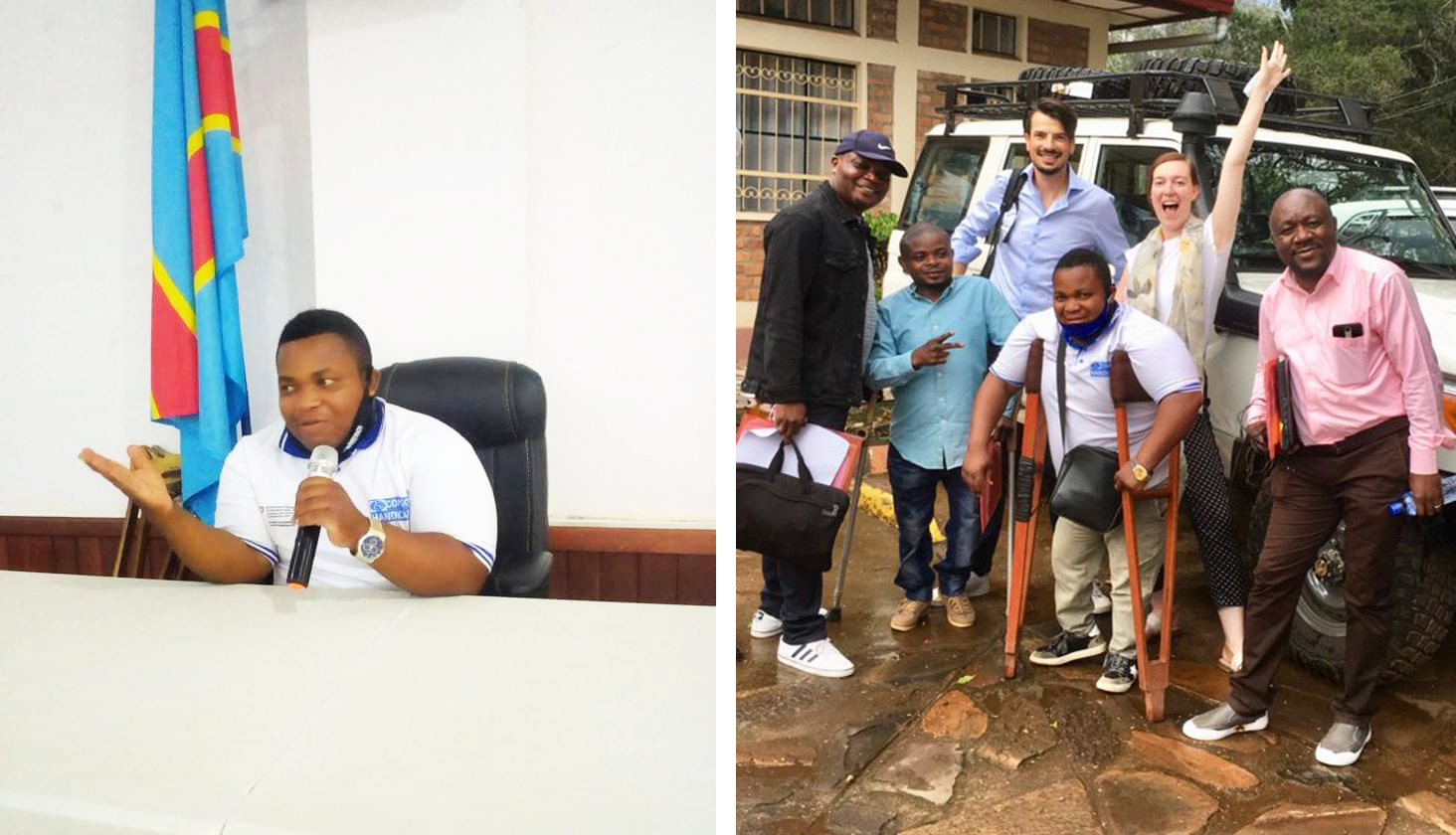Theophile Shukuru Kyolandawa is a trainer at We are Able! (WaA!, or Tuna Weza, in Kiswahili) – a programme that aims to promote local inclusion and service delivery for people with disabilities in Central Africa. Theophile is part of the country team in the Democratic Republic of Congo (DRC), operating in the South Kivu province. Through his work strengthening governments’ knowledge on key disabilities concepts, he wishes to transform the society around him and make it disability-inclusive.

Left: Theophile Shukuru Kyolandawa, Congolese trainer We Are Able! Right: Programme team DRC, 2021. The Hague Academy.
Theophile works tirelessly to help those with disabilities fully access and participate in society around them, by chipping away at the structural barriers and helping them achieve their full potential. As part of his work within the WaA! programme, Theophile will provide training on inclusive governance to public authorities and members of CSOs and OPDs (organisations of people with disabilities). To do so, Theophile followed a training with The Hague Academy on inclusive training methods for adults.
“The training allowed me to rethink the way in which I engage and communicate with political and administrative authorities, but also with members of OPDs and CSOs, around the inclusion of people with disabilities. I learned to give more attractive, engaging and energising presentations, to rigorously prepare my training sessions and to adopt a positive communication style, especially when receiving and giving feedback.”
Challenges to overcome
Theophile has faced challenges with his own disability, and he exhibits tremendous empathy towards others in South Kivu who, as he knows, face many barriers to living an independent and productive life. The most concrete example of such barriers lies with those with a physical disability. The Office of the Social Affairs Division in South Kivu, for example, is located on the third floor of a building without a ramp or an elevator. Due to this, many are not able to access much-needed state services.
Another hindrance those with disabilities face is on the institutional level. Authorities remain unfamiliar with the rights of persons with disabilities. The Democratic Republic of the Congo is a signatory of the Convention on the Rights of Persons with Disabilities (CRPD), but it is not common to find local authorities that know of the DRC’s commitments nor of what the CRPD stipulates.
While persons with disabilities are entitled to the full spectrum of rights – including education, labour and wider societal participation – measures to consider persons with disabilities in policy are often seen as entirely optional, rather than a human rights-based mandate. As Theophile laments:
“In the Democratic Republic of the Congo, authorities still confuse charity and rights…”
Theophile believes that this is not just ignorance or apathy to what all the persons with disabilities face, but it is also direct discrimination:
“Some customs, families and churches believe that a person with a disability is a curse, a shame… This is why many families break apart with the birth of a child with a disability, or many children are kept hidden in their rooms by their parents out of shame. Other children are victims of torture sessions in churches because their families believe they ought to be ‘freed from their curse’.”
As adults, persons with disabilities continue to face hardship caused by the lack of access to basic human rights. Either they are not able to study to enter a high position of responsibility in the workforce, or are not employed outright. Unfortunately for many, “they are judged on the basis of their situation and not their skill.” Many persons with disabilities, therefore, rely on smaller but more frugal trades, like basketry, shoemaking and mending clothes.
Aspiring Equality
First and foremost, Theophile wishes to transform the society around him: “there is a notorious ignorance of disability-related issues”, he says, which leads to difficulties for those with a disability and their support networks, from channelling their own aspirations to meeting their real needs.
A key step towards achieving disability-inclusive governance is to strengthen the knowledge of involved actors on key concepts related to disabilities. This means understanding the external circumstances that make people with disabilities more vulnerable and understanding the rights that they are entitled to. Lastly, “it comes down to increasing the understanding of the CRPD, article by article, to finally touch upon issues related to governance.”, concludes Theophile.
In the future, Theophile’s dream is to become an internationally renowned humanitarian actor. He explains that he will never get tired of learning. However, in his environment, he reckons he will have to fight and survive to achieve this goal. Theophile further explains that he would like to continue his training on issues related to disability and public affairs management:
“I would like to continue working on dissability inclusion and I want to become autonomous on all levels!”
Support Partners
We Are Able! is a five-year program that aims to help those who have been left out by their local societies. The programme is now operating in six countries: Burundi, DRC, Ethiopia, South Sudan, Sudan and Uganda. The We Are Able! programme was set up by the African Disability Forum, See You foundation, Leprazending, VNG International, The Hague Academy for Local Governance and Stichting ZOA, with funding from the Dutch Ministry of Foreign Affairs under the Power of Voices Partnerships for Strengthening Civil Society. The Hague Academy works closely with local trainers to strengthen their capacity to provide training on inclusive governance themselves.
